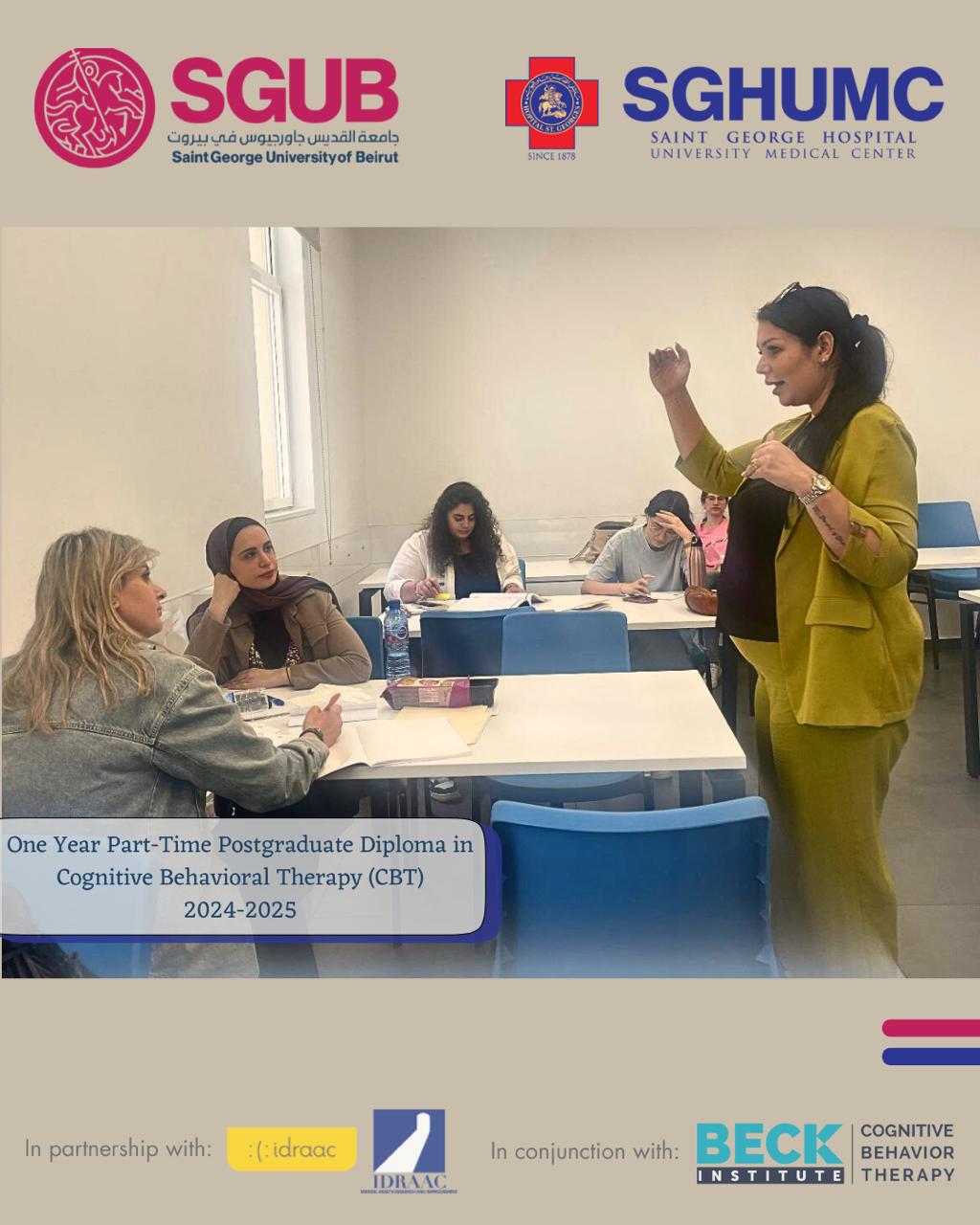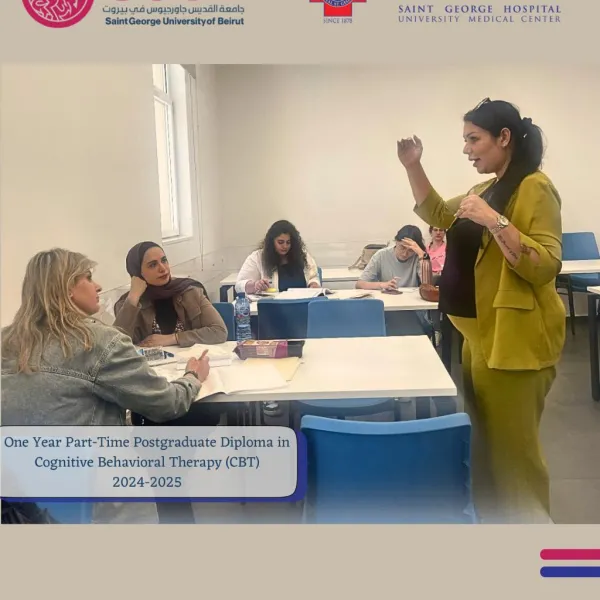Professional Diploma in Cognitive Behavioral Therapy (CBT)

A Part-Time Academic and Clinical Training Program
The Faculty of Medicine at St. George University of Beirut (SGUB) and the Department of Psychiatry and Clinical Psychology at St. George Hospital University Medical Center (SGHUMC), in partnership with IDRAAC and in conjunction with the Beck Institute, USA, is proud to offer a Part-Time Professional Diploma in Cognitive Behavioral Therapy (CBT).
This program is designed to meet the growing need for certified CBT practitioners in Lebanon and the region by offering evidence-based, structured and comprehensive training in both the theory and clinical practice of Cognitive Behavioral Therapy. This program provides a formal CBT diploma delivered in conjunction with the Beck Institute (BI).
Program Objectives
The program aims to develop therapists who are well-versed in the principles and techniques of CBT, with the ability to work with a range of mental health disorders. Specifically, it enables participants to:
● Acquire a solid foundation in cognitive-behavioral models, concepts, and methods.
● Develop skills in assessing patient suitability for CBT, cognitive case formulation, and designing individualized treatment plans.
●Apply CBT techniques effectively to a variety of common psychological problems, including depression, anxiety disorders, obsessive-compulsive disorder (OCD), post-traumatic stress disorder (PTSD), and personality disorders.
● Demonstrate competence in structuring therapy sessions, using tools such as agenda setting, goal formulation, and homework assignments.
● Build strong therapeutic alliances and manage the therapy process using cognitive conceptual frameworks.
By the end of the program, participants will be equipped to responsibly and independently apply CBT interventions in clinical settings, addressing both simple and complex psychological cases.
Why Choose This Program?
International Standards & Partnerships
This is the only program in Lebanon and the region conducted in direct conjunction with the Beck Institute (USA), ensuring that participants receive training aligned with international best practices in CBT.
A Unique Legacy
Since 1981, SGHUMC has been the first institution in Lebanon to integrate psychiatry and clinical psychology within the same department. In 1992, the first structured CBT practice in Lebanon was introduced to the department following specialized training at the Beck Institute, USA. The department has since maintained continuous professional development in CBT, in collaboration with global centers such as the Oxford Cognitive Therapy Centre (UK) and the Academy of Cognitive Therapy (USA).
Comprehensive Training Approach
The program balances theory, practical clinical skills, and supervision to ensure that students master both the scientific and interpersonal components of CBT. Trainees will work with real cases, develop case conceptualizations, and implement interventions under expert supervision.
Clinical and Research Opportunities
In addition to clinical training, the program offers unique access to IDRAAC’s research projects and data sets, allowing trainees to explore research-based evidence and contribute to scientific advancements in mental health.
Reputation and Recognition
Graduates of this program will hold a diploma jointly certified by SGHUMC, IDRAAC, and the Beck Institute, recognized by the Lebanese Order of Psychologists (LOPSY).
Course Director
Aimee Nasser Karam, Ph.D. Clinical Psychology. CBT therapist and supervisor.
Head Clinical Psychologist in the Department of Psychiatry and Clinical Psychology at St. George Hospital University Medical Center and Professor at SGUB, Faculty of Medicine.
Research fellow and a founding member of IDRAAC (Institute for Development, Research, Advocacy and Applied Care) www.idraac.org.
Academy for Cognitive and Behavioral Therapy Diplomate (ACBT).
Postdoctoral Diploma in Advanced Cognitive Therapy Studies: EABCT, Level 2, Oxford Cognitive Therapy Centre (OCTC); Oxford University, Department for Continuing Education.
This program belongs to:
Faculty of Medicine, St. George University of Beirut, Department of Psychiatry and Clinical Psychology, St. George Hospital University Medical Center (SGHUMC) and The Institute for Development, Research, Advocacy and Applied Care (IDRAAC).
Course Structure
1. Formal teaching (450 hours): The course will cover four hundred and fifty (450) hours, divided among theoretical and research issues, the essentials of the cognitive model, the cognitive conceptualization of psychological disorders, therapeutic skills and interventions used in cognitive therapy, and applied clinical teaching/team-based learning (role plays, case study discussions, small group case presentation, etc.). A workshop format will be used, involving active participation, a strong element and clear relevance to clinical practice. The course aims at fostering knowledge, skills and attitude in respect to the above topics. Coursework will be completed during the first year (after which students will continue regular supervision sessions until the required hours below are met).
2. Small group supervision of clinical casework (200 hours): Students are expected to complete at least 250 hours of clinical practice (direct patient contact). In addition, they must undergo at least 200 hours of direct supervision. Supervision aims to encourage exposure to a variety of client groups and problem types, and to a range of CBT therapeutic methods. It also targets consolidating and refining the learning, facilitating and optimizing the clinical application and shaping it to meet the principles of the best practice. Students should have received supervision during the period of training for both assessment and therapy; they are expected to follow through cases each term and record treatment sessions to review in supervision groups and individual supervision. Supervisors will provide individual feedback of students’ therapy sessions. Small group supervision takes place weekly, at the start of teaching days. Supervision ensures practical skill development and case application.
3. Guided readings (50 hours): Students need to set aside time regularly for directed personal studies. Private study of at least 50 hours of guided reading/videos.
Part I: Foundations of CBT
Focus on Beck’s cognitive model, case formulation, basic therapeutic techniques (such as Socratic questioning and thought monitoring), and assessment procedures.
Part II: CBT for Common Disorders
Application of CBT principles to mood and anxiety disorders including depression, panic disorder, social anxiety, OCD, PTSD, and eating disorders. Clinical skills will be adapted for specific diagnostic profiles.
Part III: Advanced Applications and Complex Cases
Work with complex presentations such as personality disorders, severe mental illness, childhood trauma, and therapy process difficulties. Special focus on emerging CBT methods such as compassion-focused therapy, recovery-based CBT, and metacognitive techniques.
Teaching Methods
● Formal Lectures & Workshops: Covering theory, evidence base, and practical skills.
● Clinical Case Supervision: Small group supervision of real clinical cases led by experienced CBT supervisors.
● Guided Readings & Assignments: Structured personal study through selected readings, videos, and written assignments.
● Practical Application: Work with a minimum of six real patients; supervised treatment of at least three cases is required for certification.
Assessment & Certification
Students are evaluated through:
● Written Case Reports: Including clinical formulation, treatment plans, and outcome evaluations.
● Audio/Video Recordings: Supervised evaluation of therapy sessions using the Cognitive Therapy Rating Scale-Revised (CTRS-R).
● Clinical Competency Ratings: Ongoing assessment of therapy delivery skills during supervision.
Upon successful completion of all program requirements, including clinical and written components, trainees will receive a Professional Diploma in CBT, jointly certified by SGUB, SGHUMC, IDRAAC, and the Beck Institute.
Admission Criteria
Eligible applicants include:
● Holders of a PhD or Master’s degree in Clinical Psychology, or MDs specializing in Psychiatry.
● Mental health professionals with equivalent qualifications and a minimum of one year of clinical experience in mental health.
● Applicants must demonstrate familiarity with CBT principles and commitment to developing CBT skills.
● Applicants must have access to appropriate patient populations for clinical practice.
Admission decisions are based on credentials review and a personal interview.
Number of places: 10–15 trainees per cohort.
Program Details
● Starting Date: January 2026 (exact date TBD)
● Applications Open: September 2025
● Application Deadline: November 28, 2025
● Location: SGUB Faculty of Medicine & SGHUMC Department of Psychiatry and Clinical Psychology
● Tuition Fees: $6,000 (in three installments) + refundable $500 deposit. Fees may be susceptible to change.
How to Apply
Interested candidates may download the application form here: https://docs.google.com/document/d/1IqATx4K-pBEt-Ll1oVRsV7BKIV4PhYcf/edit?usp=sharing&ouid=117868949473199673161&rtpof=true&sd=true
Please email your completed application form and supporting documents to:
Ms. Zalpha Rizk, MA
Program Manager
📧 zrizk@sgub.edu.lb
📞 +961 71 621 750
Application forms must be submitted by November 28, 2025, along with the required supporting documents, and will be followed by an interview process in December.
For further information, please reach out to the Program Manager.



